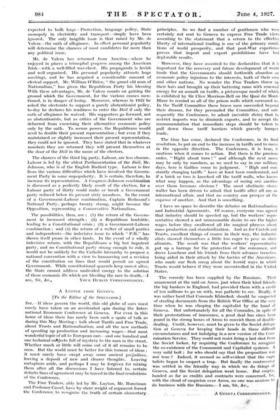A LETTER FROM GENEVA. [To the Editor of the SPECTATOR.]
ideas govern the world, this old globe of ours must surely have taken on an accelerated spin during the Inter- national Economic Conference at Geneva. For even in this home of ideas there has rarely been such a spate of talk as during this May Meeting : talk about Tariffs'and Free Trade, about Trusts and Rationalization, and all the new methods of speeding up production and increasing wages--that most wonderful topic of all to European ears—and one hundred and one technical subjects full of mystery to the man in the street. Whether much or little will come out of it all remains to be seen. But the world must be better for this torrent of ideas ; it must surely have swept away some ancient prejudices, ving a deposit of new and clearer thoughts. Leaving metaphors aside, and perhaps I may be forgiven for mixing them after all the discussions I have listened to, certain definite lines of agreement may be traced in the final resolutions of the Conference. : The Free Traders, ably led by Mr. Layton, Mr. Runciman and Professor Cassel, have by sheer weight of argument forced the COnference ta recognize the truth of certain elementary principles. So we find a number of gentlemen who were certainly not sent to Geneva to express Free Trade views assenting to the statement that a return to the effective liberty of international trading is one 'of the primary condi. tions of world prosperity, and that post-War experience proves that import and export prohibitions have had deplorable results. • • Moreover, they have assented to the declaration that it is important for the recovery and future development of world trade that the Governments should forthwith abandon an economic policy injurious to the interests, both of their own and other nations. No wonder the Free Traders threw up their hats and brought up their battering rams with renewed energy for an assault on tariffs, a picturesque model of which is exhibited by Sir Clive Morrison-Bell on the Quai du Mont- Blanc to remind us all of the prison walls which surround us. In the Tariff Committee these brave men succeeded beyond their dreams, for they persuaded the Committee, and sub- sequently the Conference, to admit (mirabile dicta) that to restrict imports was to diminish exports, and to accept the recommendation that immediate steps should be taken to pull down those tariff barriers which gravely hamper trade.
The time has come, declared the Conference, in its final resolution, to put an end to the increase in tariffs and to move in the opposite direction. The Conference, it is true, is cautious when it comes to action. But there is the precious order, " Right about turn ! " and although the next move may be only by numbers, as we used to say in our military days, here is Galileo come to judgment. " High and con- stantly changing tariffs " have at least been condemned, and if a brick or two is knocked off the tariff walls, who knows what may happen, as the' advantage 'of seeing one another over them becomes obvious ? The most obstinate stone- wailer has been driven to admit that tariffs after all are an international affair, and that no country can prosper at the expense of another. And that is something.
I have no space to describe the debates on Rationalization and Industrial Agreements. Of course, everyone was agreed that industry should be speeded .up, but the workers' repre- sentative showed a not unreasonable desire to see the higher wages before they swallowed all the magical phrases about mass production and standardization. And as for Cartels and Trusts, excellent things of course in their way, the industri- alists showed themselves a little too eager to pose as sheer altruists. The result was that the workers' representative put up a barrage for the protection of the consumer, and drove Loucheur and his friends from their advance trenches, being aided in their attack by the tactics of the Americans, who made our flesh creep about the horrid ways in which Trusts would behave if they were uncontrolled in the United States. , . .
The comedy has been supplied by the Russians. Their amazement at the raid on Arcos, just when their kind friends, the big bankers in England, had provided them with a credit of ten millions to go on with, was pathetic to see. Really, it was rather hard that Comrade Khinchuk should_ be suspected of stealing documents from the British War Office at the very time when he was clasping the capitalist by the hand at Geneva. But unfortunately for all the Comrades, in spite of their protestations of innocence, a good deal has since heel) found in the strong boxes of Arcos to convict them of double- dealing. Credit, however, must be giyen to the Soviet delega tion at Geneva for keeping their heads in these difficult circumstances and not indulging in a new version of the Colu- mniation Service. They could not resist firing a last shot from the Soviet locker, by requiring the Conference to recognize the co-existence of the Communist and Capitalist systems. A very mild bolt ; for who -should say that the proposition 'was not true ? Indeed, it seemed so self-evident that the capi- talists •began to suspect a trap. - But finally the controversy was settled in the' friendly way in which we- do • things at Geneva, and the Soviet delegation went home., -But empty- handed as far as credits and contracts were concerned, for, with the cloud of suspicion over Arcos, no one was anxious to
do business with 'the Russians.—I am, 'Sir, •&c.,






































 Previous page
Previous page